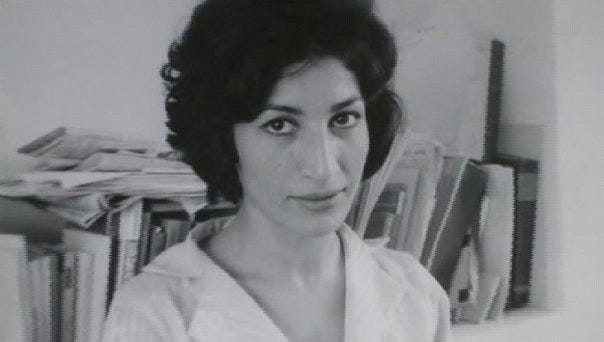Why Should We Stop?
A homage to those who fight.

A homage to those who fight
“why should I stop?
the road passes through the capillaries of life,
the quality of the environment
in the ship of the uterus of the moon
will kill the corrupt cells.
and in the chemical space after sunrise
there is only sound,
sound that will attract the particles of time.
why should I stop?”
- Excerpt from It Is Only Sound that Remains, by Forugh Farrokhzad
If you followed international news this week, the world looked quite bleak: authoritarian governments continue to violate human rights; talk of nuclear threats resurface; and after the climate change crisis there’s now a looming biodiversity crisis, a very real energy-shit-it’s-getting-cold-in-Europe crisis, and the pandemic may not be over after all. There were also several failed attempts at a coup in Germany and Peru. The laundry list continues.
And after everything that has happened these last few years, you’re probably thinking, yeah well, what else is new? My first instinct is to scurry under a warm blanket, because it’s bloody cold inside and out, and try to figure out what will kill me first: global warming, war, or my nerves.
It’s hard sometimes not to feel helpless and wonder, where is the world going with all of this? What’s the point of anything anymore?
Yet in her poem, It Is Only Sound That Remains, Iranian poet, Forugh Farrokhzad, defiantly asks why would we stop.
“what can a swamp be?
what can a swamp be but the spawning ground
of corrupt insects?
swollen corpses scrawl the morgue’s thoughts,
the unmanly one has hidden
his lack of manliness in blackness,
and the bug... ah,
when the bug talks,
why should I stop?
cooperation of lead letters is futile,
it will not save the lowly thought.
I am a descendant of the house of trees.
breathing stale air depresses me.
a bird which died advised me to
commit flight to memory.
the ultimate extent of powers is union,
joining with the bright principle of the sun
and pouring into the understanding of light.
it is natural for windmills to fall apart.”
Born in Tehran in the 1930s, Farrokhzad presents a bold female perspective in her poetry, which was often criticized before and after her death. While she died in a car accident at 32, today her contemporaries consider her as one of the most influential modernist poets of her time.

The other night, I ate ramen with my Iranian friend, T. I first met her earlier this year at a mandatory civics class that all refugees and newcomers must take in France. We share a love for Asian cuisine and have a mutual understanding of what it means to live in a country that is not our own.
These days when we meet, we talk about the protests that have swept over Iran these last few months. I don’t want to ask too many questions, because I see the anguish on her face when we talk about it. This time, she brought up the subject first. So I listened.
Earlier that day, they had executed the first anti-government protester. Simply because he was at the protest, my friend said. Her eyes teared as she thought of the people back home. She worried about her sister, who went out to demonstrate daily. I have over ten friends who are in jail now, she told me. One of them called her family, asking for her birth control pills. There have been reports of mass sexual abuse on detained female protesters. I don’t know what to say. You know they found French and Italian-made bullets on the streets, she says. I didn’t know. Did you?
Thousands of Iranians continue to protest peacefully every day, even when they are shot, tortured, and risk dying in prison. They defiantly ask why should we stop.
Today, I want to pay homage to those who bravely stand up to oppression daily, defending their rights and freedom, and defending the rights and freedoms for those who cannot.
I want to pay homage especially to the women, who never surrender and never give up the fight despite the horrible things they face. Many who are much less fortunate and privileged than their white western counterparts.
Too many people have brutally lost their lives for simply defending what we all equally deserve as human beings. And for that, they should be remembered and recognized for their sacrifices. This is why we shouldn’t stop.
There is a revolution going on in Iran, led by courageous women and supported by a generation of young men. There is more happening around the world. It seems like oppressive and authoritarian governments are cracking down harder not only on those who oppose them but on their own people, simply for existing.
Iran and Persian culture have a longstanding history of producing some of the most inspiring poets who’ve influenced both Eastern and Western literature alike. Love, mysticism, and humanity have appeared in works by many, such as Rumi, Hafez, Sohrab Sepehri, Simin Behbahani, and Forugh Farrokhzad. A new generation of poets, many now in prison or living abroad, continue to inspire with their rousing words. Like Farrokhzad, they defiantly ask why should we stop.
I think of them when I cowardly contemplate giving up.
They are, of course, right.
We should not.
Read Forough Farrokhzad’s entire poem here.
Other things worth sharing
- Not all was grim this week. A debut author gets encouragement from big names after a “lonely book launch”.
- Another friend of mine recently mentioned she read the manga version of The Unwomanly Face of War. Written by Nobel Prize winner Svetlana Alexievich, this oral history captures the voices of over five hundred women who bravely served in the Red Army during the Second World War. I’ve put both versions on my reading list.
- Here’s a great article about women currently fighting the war in Ukraine.
- Lawrence Yeo hits the nail on the head with this illustrated explanation of the problem with how we measure creative success. He says we should pursue mastery instead.
- “I, too, have Trudeau’d.” Trevor Noah uses the Canadian Prime Minister as a verb in his Netflix special, I Wish You Would, which was filmed in Toronto
I watched it two days before realizing that this was his last week on the Daily Show. You can find his farewell clips currently simmering at the top of his search results. I’ll leave you with his parting words:
“Please don’t forget that the world is a friendlier place than the internet and the news will make you think.”
- Trevor Noah.
This is why we shouldn’t stop.
Happy writing, happy creating.





